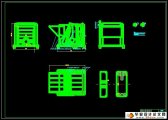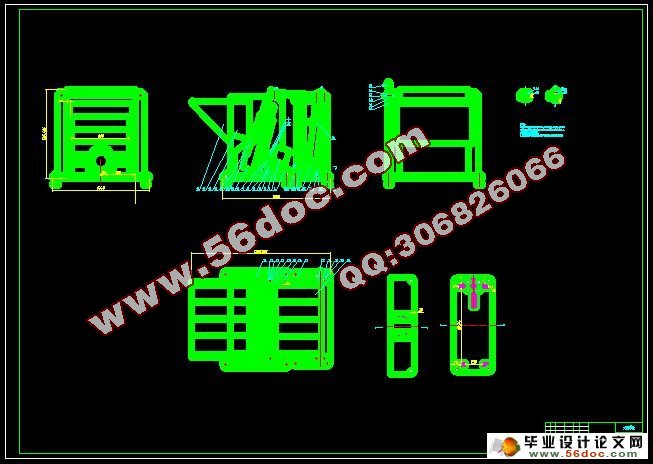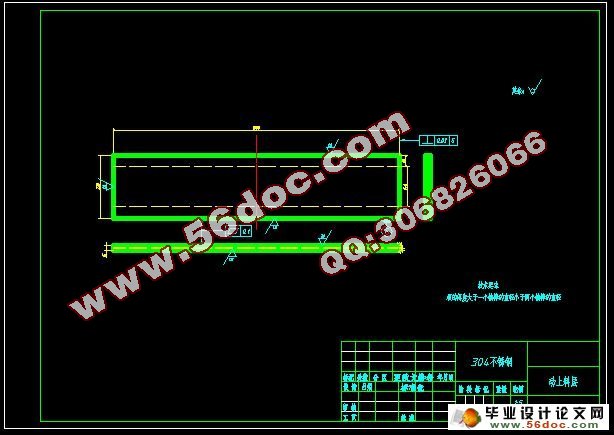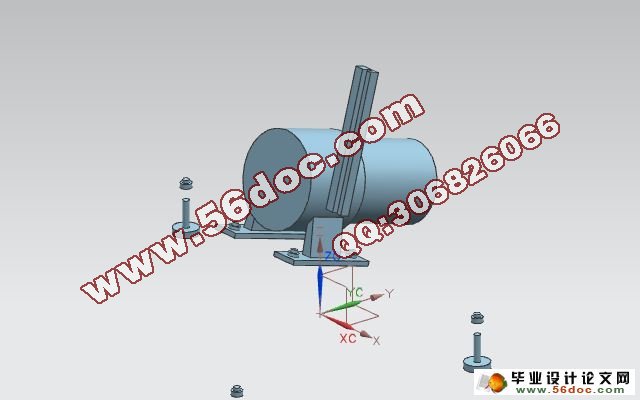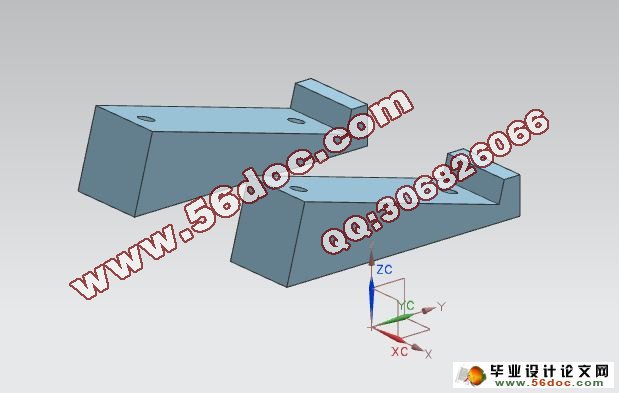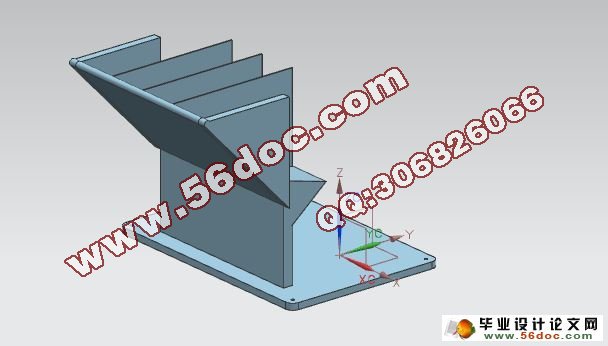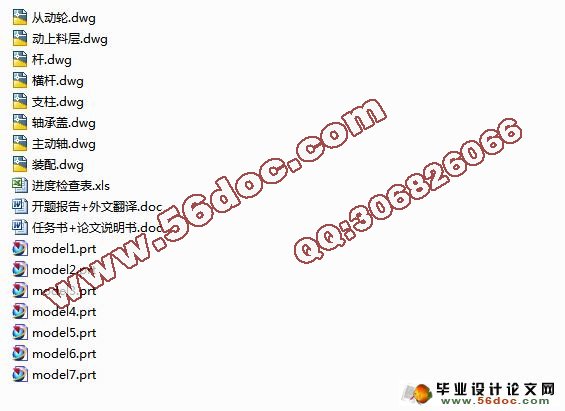饲料上料机的设计(CAD,UG三维)(任务书,开题报告,外文翻译,论文说明书22000字,CAD图纸8张,UG7张)
摘 要
上料机是生产流水线里必备的产品。主要用于生产加工企业,上料机还分为单体式全自动真空上料机与分体式大功率全自动真空上料机。当前社会发展迅速,人们生活水平不断提高,饲养宠物越来越成为家庭的一种习惯,因此宠物饲料的发展得到较大的发展.目前我国的宠物饲料的加工生产,包装等都还很低端化,企业都是劳动密集型的加工企业,依靠劳动力去发展的企业效率低下,企业利润空间有限,因此宠物饲料的自动化加工生产势在必行。
上料机种类众多,用途各异。宠物饲料的上料设备是一种机械化,自动化设备,把饲料送至输送带,进行包装,目前国内发展还很缓慢, 而且宠物饲料以颗粒状和长条状居多,其中长条形宠物饲料的加工多以手工为主。如制造、计数、包装成袋等。生产效率极其底下,很难完成客户的供货需求,同时,工人的劳动强度也很大。而对于宠物饲料,进行生产自动化的关键难题是难以对饲料进行有序排列,从而利用光电技术和包装技术完成自动化计数包装。因为对于宠物饲料,如长条型宠物饲料尺寸形状不规则,直径和长度尺寸变化大,这些都给自动化上料设备的研制带来很大的困难。本设备就是设计针对不规则长条形宠物饲料设计上料排序装置,完成宠物饲料排序、计数和自动化包装,提高企业的生产效率,降低工人的劳动强度。同时,绘图过程中也借助于CAD进行了辅助设计,提高了设计效率。
关键词:上料机;不规则长条形宠物饲料;自动化;上料;CAD
ABSTRACT
Feeding machine is necessary in the production line of products. Mainly for the production and processing enterprises, feeding machine is divided into monomer type automatic vacuum feeder and high power fission automatic vacuum feeder. The current social development is rapid, people life level increases, keeping pets has become more and more family a habit, so the development of pet food to get bigger development. At present our country's pet food processing production, packing and so on are the low end, enterprise are labor-intensive processing enterprise, rely on labor to the development of the enterprise the efficiency is low, the enterprise profit space is limited, so the automation of pet food processing production is imperative.
Feeder are numerous, USES each different. Pet food feeding equipment is a mechanical, automation equipment, the feed sent to the conveyor belt, for packaging, the current domestic development is slow, and pet food with granular and strip shape is in the majority, which strip form pet food processing by hand to give priority to. Such as manufacturing, counting, packing into a bag, etc. The production efficiency under extremely, it is difficult to complete customer delivery requirements, at the same time, labor intensity of the workers are also great. And for pet feed for production of the key problem is difficult to automation to feed the orderly arrangement, thus using photoelectric technology and packaging technology complete automation count packaging. Because for pet food, such as strip type pet feed size irregular shape, size and length size change big, these to automatic feeding device a lot of difficulties. This equipment is designed for irregular elongated pet food material sorting device design, and complete the pet food, sort and count and automatic packaging, enhances the enterprise the production efficiency, reduce the labor intensity of the workers. And the means of CAD-aided design is applied in drawing process to improve efficiency.
Keywords: Feeder ; Irregular elongated pet food; Automation; Feeding;CAD
课题研究内容
本课题设计的宠物饲料上料设备包括饲料的上料装置和饲料的传送计数装置.用UG作三维设计工具,AutoCAD作二维设计工具,完成上料设备的总体方案设计、电动机动力传动结构的设计、上料架的设计与校核和重要零部件的简单造型设计,并对传动计数包装进行简单的设计,主要为了实现上料到包装的一体化设计,最后绘制出主要部件的装配图并进行简单的运动仿真。
本课题主要作了以下工作:
[1] 通过参照现有上料设备的模型,设计出符合要求的上料设备;
[2] 通过参考网上的资料进行总体方案设计和设备系统分析;
[3] 对上料架进行设计并进行校核,以确保工作的安全性;
[4] 通过对上料设备的工作要求的研究,确定主要零部件的尺寸及参数;
[5] 利用UG进行运动三维造型并进行简单的运动仿真;
[6] 由UG三维实体转出CAD二维图,并对其进行修改、完善,编写说明书;
目 录
摘 要 III
ABSTRACT IV
目 录 V
1 绪论 1
1.1 宠物饲料上料设备概述 1
1.2 宠物饲料上料设备发展现状及问题 2
1.3 课题研究内容 3
1.4 课题研究的目的和意义 4
2 设备整体方案设计 5
2.1 产品介绍 5
2.2 设备系统分析 5
2.2 设备零部件分析 7
2.2.1 减速电机 7
2.2.2 电机座 8
2.2.3 前底板 9
2.2.4 连杆 9
2.2.5 上料架 10
2.2.6 横杆 11
2.2.7 动上料层 12
2.2.8 定上料层 12
2.2.9 侧箱体 13
2.2.10 后底板 14
2.2.11 支柱 15
2.2.12 滚动轴承座 16
2.2.13 滚动轴承 17
2.2.14 杆 17
2.2.15 轴承盖 18
2.2.16 从动轴 18
2.2.17 主动轴 19
2.2.18 带轮 19
2.2.19 下料槽 21
2.2.20 输送带 22
3 重要零部件强度验算 25
3.1 电机的动力提供 25
3.2 连杆强度校核 25
3.3 横杆强度校核 27
3.4 带传动和主动轴的强度验算 27
3.5 重要零部件保养的重要性 28
4 UG三维仿真 30
4.1 UG三维仿真 30
4.2 结构分析 30
4.3 仿真的意义 35
5 结论与展望 37
5.1 结论 37
5.2 不足之处及未来展望 37
致 谢 38
参考文献 39
|
